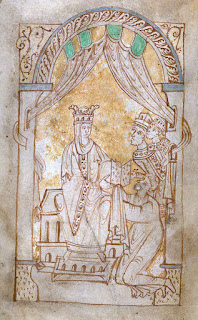The site now remains as a record of the blog, and I hope it will be useful for researchers who are studying these plays or the Diary. However, please note that the site is not peer-reviewed and may contain errors; it should be treated as a starting point for research, not as an end point. I will periodically update or correct the entries if I find new information.
Other information can be found in the links on the right.
What follows is an alphabetical list of the first entries on each play mentioned in the Diary. I encourage use of the 'Further Reading' sections of each entry for the most accurate information.
Extant plays
- The Battle of Alcazar by George Peele (as "Muly Molocco" and/or "Mahomet")
- The Blind Beggar of Alexandria by George Chapman
- Captain Thomas Stukeley by Thomas Heywood
- Fair Em, the Miller's Daughter of Manchester (as "William the Conqueror")
- Doctor Faustus by Christopher Marlowe
- Edmund Ironside (as "The Tanner of Denmark")
- Friar Bacon and Friar Bungay by Robert Greene (as "Friar Bacon")
- George a Greene, the Pinner of Wakefield
- Henry VI, Part One by William Shakespeare and others (as "Harry VI")
- Hieronimo, First Part (as "The Spanish Comedy of Don Horatio")
- Old Fortunatus by Thomas Dekker (as "Fortunatus")
- A Humorous Day's Mirth by George Chapman (as "The Comedy of Humours")
- The Jew of Malta by Christopher Marlowe
- John of Bordeaux (as "Friar Bacon")
- King Leir and his Three Daughters
- A Knack to Know a Knave
- A Knack to Know an Honest Man
- A Looking Glass for London and England by Robert Greene and Thomas Lodge
- The Massacre at Paris by Christopher Marlowe
- Orlando Furioso by Robert Greene
- The Spanish Tragedy by Thomas Kyd (as "Hieronimo")
- Tamburlaine, Part One by Christopher Marlowe
- Tamburlaine, Part Two by Christopher Marlowe
- The Taming of the Shrew by William Shakespeare
- Titus Andronicus by William Shakespeare and George Peele
Lost plays
- Abraham and Lot
- Alexander and Lodowick
- Barnardo and Philametta
- Belin Dun
- Bindo and Ricciardo
- Bourbon
- Brandimer
- Buckingham
- Caesar and Pompey
- Caesar, Part Two
- Chinon of England
- Cloris and Ergasto
- Constantine
- Cosmo
- Crack Me this Nut
- Cutlack
- Diocletian
- Disguises
- Esther and Ahasuerus
- The Fair Maid of Italy
- Five Plays in One
- Fortunatus
- Frederick and Basilea
- A French Comedy
- The French Comedy
- The French Doctor
- Friar Francis
- Friar Splendleton
- Galfrido and Bernardo (hoax entry)
- Galiaso
- Godfrey of Bouillon
- God Speed the Plough
- The Grecian Comedy
- Guido
- The 'Ur-Hamlet'
- Hardicanute
- Harry I
- Harry of Cornwall
- Hengist
- Hercules, Part One
- Hercules, Part Two
- Huon of Bordeaux
- The Jealous Comedy
- Jerusalem
- Julian the Apostate
- King Lud
- Long Meg of Westminster
- Longshanks
- The Love of an English Lady
- Machiavel
- The Mack
- Mahamet
- Martin Schwartz
- The Merchant of Emden
- Muly Molocco
- Nebuchadnezzar
- The New World's Tragedy
- Olympio and Eugenio
- Osric
- Palamon and Arcite
- Paradox
- Philippo and Hippolito
- Phocas
- Pope Joan
- Pythagoras
- The Ranger's Comedy
- Richard the Confessor
- Seleo and Olympo
- The Set at Maw
- The Seven Days of the Week and The Second Week
- The Siege of London
- Sir John Mandeville
- Tamar Cam, Parts One and Two
- The Tanner of Denmark
- Tasso's Melancholy
- That Will Be Shall Be
- Time's Triumph and Fortune's
- The Tinker of Totnes
- Titus and Vespasian
- A Toy to Please Chaste Ladies
- Troy
- Uther Pendragon
- Vallia and Antony
- The Venetian Comedy
- Vortigern
- Warlamchester
- The Welshman
- William the Conqueror
- The Wise Man of West Chester
- The Witch of Islington
- A Woman Hard to Please
- The Wonder of a Woman
- Zenobia




.jpg/700px-Portrait_of_Alof_de_Wignacourt_and_his_Page-Caravaggio_(1607-1608).jpg)












